Month 13:15, Week 2:7 (Shibi'i/Sukkot), Year:Day 5945:369 AM
2Exodus 8/40
Gregorian Calendar: Tuesday 17 March 2022
Book of Revelation XIV
Between the Present & the Future I
Bishops, Pastors, Koinonia & Unity
Second Expanded Edition, 19 March 2022
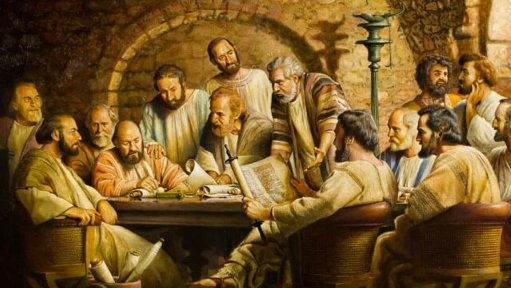
Continued from Part 14
Introduction
Shabbat shalom kol beit Yisra'el and Mishpachah and welcome back to the fourteenth part of our study on the Book of Revelation. Each sabbath we pause our own stories in the world - our own life narratives - and we turn our gaze together, by command, to Yahweh. We break our regular cycle of work and entertainment to commune with He who is above all cycles, all lives, all experiences, all personal dreams and hopes, and link ourselves to the bigger picture - to the coporate covenants. Or at least that is what we're supposed to do. On the sabbath we take a break from our own dramas and as a Body we seek the timeless for 24 hours as a single, united allegorical Bride of Messiah. This is the day when we become, corporately, the idea we aspire to. The way we treat the sabbath is surely a mirror on how view eternity.
Traveling in Time
Have you ever had a dream where you've gone forward into the future into a totally unknown world full of unknown faces and felt utterly disconnected? People who wake up from long comas often experience something like that. And there are not a few science fiction dramas and movies that explore that kind of thing. In that situation you are one kind of victim because you're wholly clueless about your environment and your history. But what about going back in time? There you have the advantage over everyone else, assuming you took the trouble to learn history, but you're still isolated, out of your own 'fishtank', as it were, and in your ancestors' world. And not a few science fiction stories and moves have been made exploring that too.
Looking Back a Generation or Two
I had such a dream a few days ago. I was taken back in time to 1939, just before the outbreak of the Second World War and the 6 years of horror that followed. Only this dream was different as I tried to remain hidden so as not to create trouble and to work out how to survive in this unfamiliar, and yet sort of familiar, environment because this had been the world of my parents and their friends about which I had heard so much growing up. It was a much simpler, 'cleaner' environment in so many ways, and yet, of course, it lacked the many technological conveniences which we now take for granted and upon which we depend and now come to view as indispensable. I don't know how this dream came about, how much was a longing to leave this dystopian new world we now find ourselves in today which is getting more and more dystopian by the day, but which for those of you who are young is the only world you have ever known.
 Going back in time...
Going back in time...
Imagining an Even More Dystopian Future
Adjusting to what you know is much 'easier' than adjusting to the past, were you able to time travel back, say, into the time of my youth, or into the hypothetical future. It is, after all, in the imagination that we work out moral questions. And jugding by all the futuristic movies being screened by Netflix, the vision people have of the future is both alien to what we have only ever known as a race and looks more like hell than any paradise. Indeed, mankind seems to have largely abandoned any hope of Utopia in this nihilistic, postmodernist era. For that reason I am grateful for the memories passed on to me by my parents' Edwardian and Georgian generation and to a lesser extent the Victorian generationm of their parents before that while they were still alive in my youth.
The Mistake that Compromise with Tyrants Is
The year before 1939 - 1938 - in spite of the terrible, bloody Spanish Civil War being waged and ending in that year, the politicians from the Western liberal democracies, having experienced the horrors of the Great War that had ended a mere 20 years earlier, were keen to avoid another one. They mistakenly believed that the dictators could be appeased by compromise and then, a year later, another global disaster happened. Disconnecting from our ancestors, in the name of some unrealisable Utopia, however good or evil those ancestors were, is a grave error. We ought to do serious history, even if it does not particularly interest us, precisely so that we do not repeat the mistakes of the past, a discipline sadly little learned. We're given the Bible, full of the lessons of the past spanning at least 3,000 years, in part to remind us not to repeat the same errors of old that led to so many great catastrophes.
The New Metaverse Matrix
Today, the crazed attempt to rewrite history, as George Orwell accurately predicted would happen in his novel, 1984, though now in the name of 'social justice', is then surely one of the greatest mistakes anyone could ever make because a doctored history can teach us nothing and only prop up lifeless fantasies. Fantasy has a rôle in life but we cannot live by it. We we built to live in reality not in an artifically constructed cyber-Metaspace envisioned by the Zuckerberg's of this world. The approximately one third of the population which will choose to be sucked into, and remain in, this ultra-Matrix, will almost certainly never emerge from it again, save for a tiny handful. To choose to live in it, as so many will be tempted to so as to avoid pain and responsibility, is a choice for destruction of all that is human, and leads to complete mental disconnection and effectual oblivion.
 The easily controllable Metaverse the élites want us to inhabit
The easily controllable Metaverse the élites want us to inhabit
The Reality of Yahweh's Future
The Bible alone, and most especially the Book of Revelation which has so much prophecy in it, being the only book of its kind in the New Testament, contains from chapter 4 onwards what we might call actual 'future history', carrying on a well established tradition from the Tanakh (Old Testament) where Elohim (God) demonstrated that He, and He alone, is both above and in time and knows what the future holds. It isn't fantasy even if the symbols might appear fantastic to the uninformed. And because the human soul needs hope, Yahweh assures us we can trust in the future that He promises based not only on His foreknowledge but also, and most especially, His righteousness and justice.
The Right and the Wrong Kind of Optimism
We can, should, and must be optimistic about His promises. But "optimism" in our own imagination and dreams, to borrow something Peter Hitchens said the other day, "is the handbook of fools, It is the key to unhappiness. I can't think of any better way of making yourself miserable." Abraham Maslow similarly observed that "false optimism sooner or later means disillusionment, anger and hopelessness." This is one reason we study the nevi'im (prophets) because Yahweh infallibly shows them the future, and it's the reason that we listen most attentively the the 'navi (prophet)-greater-than-Moses' (Ac.3:22; 7:37), because as the Creator He has a complete and perfect knowledge of past, present, and future. I'm of course speaking of Yah'shua the Messish (Jesus Christ).

The Bible for Pre- and Scientific Ages
Some prophetic language is plain but some, because it relates to things we can't possibly yet understand with our present knowledge-base and language skills, because we've forgotten how to do so, is couched in more obscure terms so as to be translatable in every generation of time whether from the pre-scientific or scientific age. The skill-set required to understand the Book of Revelation is minimalist - you don't need a university education - but often you do need someone knowledable in the symbols of the pre-scientific past to make sense of them and avoid the temptation to read too much into them. For there is a language of the spirit which we frequently encounter in our dreams that at times baffles us because it makes no sense within the context of space-time. Such was the dream I had last Monday. I was not linking to anything with my physical senses (since obviously I was asleep) but to something above time and matter. I was communing with a person whom I did not know and whose face I did not see (because it wasn't about a literal person but rather the personification of something abstract) but that 'person' knew me, and whilst that was at first a little disconcering, it was also both stimulating and reassuring. And that is the only way we can relate to prophecy such as we find in the Book of Revelation. The pictures aren't usually to be taken literally because, for example, there are no multi-headed beasts with horns and wearing crowns.
The Reason for Congregational Teachers
Forgive me if I repeat this many, many times but unfortunately most believers stubbornly refuse to view Scripture in its original historical and cultural context and accordingly make serious mistakes of judgment. This is why "in the messianic community (church) Elohim (God) has appointed...teachers" (1 Cor.12:28, NIV) because we haven't yet reached that state of purity where, as Jeremiah prophesied:
"'No longer will a man teach his neighbour,
or a man his brother, saying, 'Know Yahweh,'
because they will all know Me,
from the least of them to the greatest,'"
declares Yahweh.
'For I will forgive their wickedness
and will remember their sins no more'" (Jer.31:34, NIV; cp. Heb.8:11).
If you've ever met someone who's told you, citing this passage, that they don't need to be taught by human beings because they have 'the Spirit' as their personal instructor, you'll know what I mean. Such tend to be very independent-minded and not to like congregational life too much...unless it's (ironically) to draw their own following.
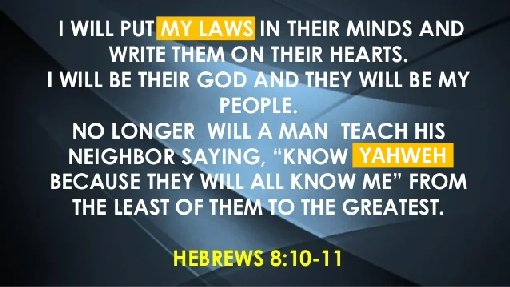
From the Present to the Future
Today we are taking a small break from our word-for-word and sentence-for-sentence examination, and exegesis of, Revelation and by that I mean we're going to pause in the Narrative because what follows, though it's clearly linked to the first Act or 'Act 1' that we finished last week, suddenly changes direction into the unknown. For three chapters we have been looking at the present, at least what was the 'present' to seven of the congregations in Asia Minor at the end of the first century AD, and we have done so using the tools of the historian and come to understand that much of the language the Saviour uses was very much linked to local circumstances - the lukewarm water of Laodicea, for instance, that we spoke of last time. But everything after Chapter 3 concerns the future, first their immediate future but also, as we shall see, our future too, because so much in this book concerns the very end times. It's about the 21st century and beyond.
Correction Must Be Carried Out in the Present
One important thing to realise about the first 3 chapters is that they're concerned with the 'present', which we can also apply to ourselves too because they contain universal principles that may be found in anyone's present. Importantly, what was lacking in the seven assemblies required correction in the here and now. Christ demands immediate action if there is to be any hope for a positive outcome of presently challenging events. An alcoholic isn't going to solve his messed up relationships with family, friends and coworkers until he has squarely dealt with his alcohol problem first. An adulterer isn't going to be able to fix his shattered family until he has first dealt with, and quit, his life of adultery. And a disintegrating country isn't going to fix its economic and social issues until those corrupt persons engaged in polictial leadership are first removed because the ones who caused the problems in the first place are almost never able to fix them - and we all know how politicians will do everything in their power to cling onto office. A person who is bedbound because of serious illness and finds himself unemployed cannot get back to work until he has first recovered. Similarly, someone who is a prisoner of serious, habitual sin, which is usually some kind of idolatry, cannot serve effectively and productively in the Kingdom of our Elohim (God) until he has first got that sin dealt with and put out of his life.
Sin Must Be Dealt With Immediately
Postponing making changes to a future time was, is, and always will be, very dangerous - so dangerous, in fact, that Yah'shua (Jesus) warns the seven congregations of Asia Minor they are in danger of individually in some cases - but most certainly as a community - losing their place in the heavenly Kingdom of Yahweh. Which leads us to an important point: when sin is exposed, Yahweh expects us to deal with it immediately and such grace or undeserved loving-kindness that has so far been extended to us, as He has patiently born with our sinning, will not extend indefinitely. We do not operate on an infinitely available line of credit purchased for us on the cross. Like a kind boss who does not fire an employee with an alcohol problem immediately, but gives him a certain amount of time to get himself fixed by getting into a rehabilitation program like Alcoholics Anonymous, so too our Heavenly Father gives us the opportunity and a reasonable period of time to go to His Son for spiritual rehabilitation.
The Lampstands Aren't Unconditionally Fixed
The language of the Book of Revelation is, nonetheless, unambiguous - if you don't quickly set about puting things right, it may soon be too late. Those "seven golden lampstands" (Rev.1:12, NKJV) aren't cemented permanently to the Throne Room floor - they can, will be, and were (in all seven cases historically) - removed from the presence of Yahweh (Rev.2:5). Whether 'soon' is this very day, in a few weeks' or months' time, or even a few years' time, is besides the point, because one thing Christians and Messianics are not allowed to do is gamble. And procrastination - delaying making a choice - is gambling. Indeed, not making a choice is making a choice, invariably a negative choice. Yahweh isn't going to make that choice for you - He isn't a Calvinist or a Moslem fatalist. We are not controlled by 'destiny' or 'fate', what the Arabs call kismet but which we not infrequently imagine we can live by - we live by free agency. We have the power of choice and Yahweh is never going to remove that from us. Your refusing to choose is, in most cases, the same as choosing to say 'no'. Make no mistake about that.
The Pagan Fates of Destiny
The ancient pagan world believed in 'fate', 'destiny' and 'luck'. It was very superstitious. The Hebrews, virtually alone amongst the people of the earth, did not because Yahweh instructed them that reality was not structured like the pagan world but around the Creator Yahweh Himself whose name means 'I am that I am' or 'I am the ultimate reality'. In the ancient Greek and Roman worlds, the 'gods' (actually, 'goddesses' like Moira and Parca) determined human destinies - the span of a person's life and the allotment of misery and suffering. From about the 8th century BC, the period of the poet Hesiod, the Fates were personified as three very old women who spin the threads of human destiny. They were called Clotho (the Spinner), from which we get the English word 'cloth', Lachesis (the Allotter), from which I believe we get the English word to 'latch 'onto, and Atropos (the Inflexible), from which we get the English word 'atrophy'. Clotho allegedly spun the 'thread' of human life, Lachesis dispensed it, and Atropos cut the thread at the moment of death. The Romans had their three equivalents of these Greek goddesses called Nona, Decuma, and Morta, from which we get the English word 'mortal'. Which leaves the Hebrew supremacists in a bit of dilemma because if you were to strip away every pagan-derived word from our modern languages there wouldn't be much of any language left.
 The three pagan 'Fates'
The three pagan 'Fates'
Themis, Justice and Nymphs
Another pagan deity which you'll see outside practically every courthouse in the West is Themis, from which we get the English word 'theme', who was represented as a woman of sober experience carrying a pair of scales. The Western version has embelleshed this someoe what by blindfolding her (to symbolise impartiality) and giving her a sword in her empty hand representing Justice. There are other pagan deities associated with fate but we won't trouble ourselves over them other than to mention that some were associated with 'nymphs' who were minor deities represented as beautiful women associated with inhabiting and sometimes personifying features in nature such as trees, waters and mountains, what today Wiccans and others would call 'nature spirits'. We see them portrayed in today's movies like Avatar. I mention them only because one of the New Testament characters we mentioned last week was called Nympha, the lady who according to Colossians made her home available in Laodicea to believers to meet in (Col.4:15).
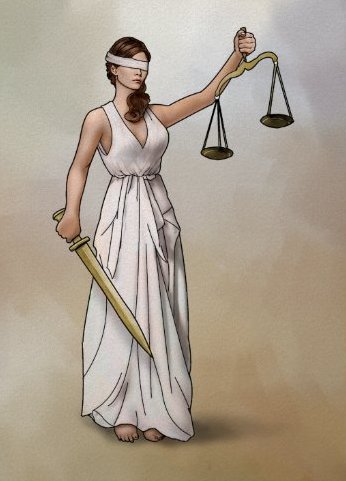 Themis, the pagan goddess of justice
Themis, the pagan goddess of justice
Divine Intervention and Human Free Will
Needless to say all these 'gods' and 'nature spirits' are simply demons trying to usurp powers and authorities in nature and particularly human life not granted them by the Creator and so are radically out of alignment with divine tavnith or pattern. Though Yahweh directs the overall course of history and intervenes occasionally to ensure that the course leading to the final outcome is maintained, and though He determines when we are born and when we die (and therefore the circumstances into which we are born), and whilst there is no such thing as 100 per cent free agency (because of the way we interact with other people) we are given genuine, maximal free will. We are free to follow Yah'shua (Jesus) and the path He has set out for our life or not to. We are free to obey His mitzvot (commandments) or not to, and indeed we are free to respect that God-given free agency of others or not to but we face very serious, and sometimes dire, consequences if we either refuse to choose or interfere with others choosing because as I have said, not choosing is, in fact, to make a choice. To refuse to make a choice to stop sinning is a choice to continue sinning, and there is an expiry date for believers who make that choice passively. For that is when they are handed over to Justice, as the world is being right now as I speak in this Penultimate Judgment.
A Look into the Asian Congregations' Immediate Future
Part of what I want to do today is to prime you into looking into the future. And no, don't worry, we're not going to do any divination using such things Tarot cards, Astrology or Psychic readings, 'remote viewing', 'astral projection', or anything occultic like that! Specifically what we're going to do, from the point of view of the believers in the seven congregations of Asia Minor, is to look into their immediate future, at least the future of two or three of those congregations. For us it's history, thank goodness, but I am quite sure they would have loved to know what we now know about them. We are able to do that thanks to some very early letters sent by leaders of the second generation of believers that have survived. By 'future' I mean a couple of decades after Yah'shua (Jesus) instructed the apostle John to relay the seven letters of chapters 1 and 2 to the pastoral heads of each of the congregations they concerned.
Sameness, Differences and the Essence of True Unity
A lot can happen in two decades and a lot did and this ought, I hope, to make you aware of just how changing and fleeting this life really is. When you throw a group of willful human beings together, then certain things happen, as we all know, because a complex dynamic results. Moreover, no two groups can ever be the same because no two people are the same. And though there was a lot the seven assemblies had in common based on geography, language and time, they were also uniquely different. These differences came about as the result of the interaction of these believers with their environment, which was overwhelmingly pagan, Greek and Roman, their own individual temprements handed down to them by their parents, and free-will choices as well as their collective reactions and interactions. No two individuals are ever the same, no two families are ever the same, and no two assemblies are ever the same. Right from day #1 when the Besorah (Gospel, Good News) was proclaimed, the greatest challenge as well as the greatest need was, and still is, unity or echad, and the ability to answer the question: what is essential for unity that we must willingly sacrifice for it, and what is not?
The Koinonia
Let me explain. One Greek word that figures prominently in the pastoral epistles of the apostles, and indeed as we shall see in the epistles of the leaders of the second generation, the Post Apostolic Fathers like Polycarp and Ignatius, is koinonia. We first encounter its being urgently used by Paul in his letter to the Philippians. This Greek word is usually translated as "fellowship" in our English Bibles which is not an untrue rendition but far too weak in conveying the full sense in whicht Paul and other leaders of the first and second generations used it. What, for instance, do you mean when you speak of 'fellowship'? It's a very commonly used word amongst Christians and Messianics and we too use it in various ways, but most commonly in the sense of 'being together'. A modern colloquial expression, at least in America, might be to 'hang out' with one or more people, usually friends. You'll often hear it used in Evangelical Churches in connection with having a coffee or a cup-of-tea in the hall after a meeting. Chatting and eating or drinking together creates 'fellowship', which it certainly does. But the word koinonia is far, far more than friendship.

Fellowship Like Siamese Twins
Since the topic of commerce has cropped up more than once in our encounters with the secular life of the seven assemblies of Asia Minor, most recently last week in Laodicea, let me point out that the word koinonia would have been used in that society as of the connection between two business partners. However, the word is more nuanced in the New Testament. If, in the ancient world, Siamese twins were born, they would be said to have koinonia in blood, meaning that their link was so strong and inter-dependent that if one died, the other would die too. In other words, Christian/Messianic koinonia must be of that kind of quality and durability too. Break it, and something infinitely precious dies akin to the break-up of a marriage. What happens to one happens to the other. What happens to one happens to, or powerfully affects, the whole fellowship or congregation. That's koinonia. That's the biblical meaning of what we in English call 'fellowship'. It is infinitely stronger and more precious than 'hanging out'.
 Koinonia is like business partners or Siamese twine
Koinonia is like business partners or Siamese twine
Unity from Caring for Others
In the case of the Philippian assembly (church), the koinonia there was being adversely impacted by two of its women members whose names were Euodia and Syntyche. From the way they were behaving you'd have thought their names were 'Odious' and 'Very Touchy'! They were constantly disagreeing and this was sending negative, destructive ripples into the life of the Philippian congregation. It was destroying their koinonia. Theirs was a problem of disunity, not the disunity that sometimes occurs between loving souls but the disunity that is the result of our old enemy, pride. They were more concerned about themselves than about each other. And Paul's answer to the problem was succinct and simple: 'When each of you cares more for others' interests than for your own, you'll be united.'
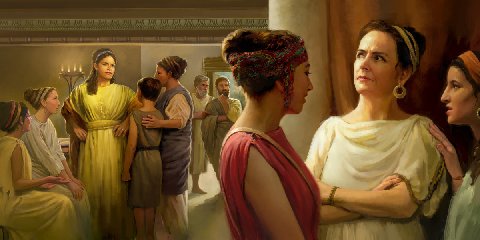 The Philippian sisters, Euodia & Syntyche were disrupting the unity and fellowship
The Philippian sisters, Euodia & Syntyche were disrupting the unity and fellowship
The Basis of Good Relationships
We're never all going to agree about everything. We're too ignorant and finite, we're all still learning and growing. A hallmark of unity is getting along when you don't agree about everything. I always say to people, find common ground, make that the basis of a solid relationship, and agree to disagree about the rest. Now, of course, real problems arise in a Christian or Messianic community or congregation when believers fall out of agreement with the Scriptures, and I don't mean differences just in interpretation which are most often a function of ignorance that some sound instruction can put right. We have to be patient with one another in that regard. I'm talking about disagreeing with Yahweh's Davar or Word when it speaks plainly and unambiguous. This is a reason why we have a Constitution which new members must subscribe to.
The Jewish Festival of Purim as an Example of Disunity
Let's take today, for instance. In the rabbinical Jewish calendar used in most Messiani circles, today (in 2022) is the second day of Jewish festival of Purim, the Feast of Lots. We used to celebrate this festival once because it's mentioned in the Book of Esther, and that's one of the main reasons they do still but also because the rabbis have always put such a strong emphasis on it - but we don't celebrate it any longer because, well, Yahweh never commanded us to (it's not in any Torah instruction, and no recognised navi/prophet ever commanded it in Yahweh's Name), and the Book of Esther is properly regarded as an apocryphal book that wasn't in the canon of either the Israelites (it's not among the Dead Sea Scrolls, our oldest known Old Testament) or, as we learned recently, in the first Christian/Messianic canon put together by Bishop Melito of Sardis, one of the seven Assian congregations of the Book of Revelation.
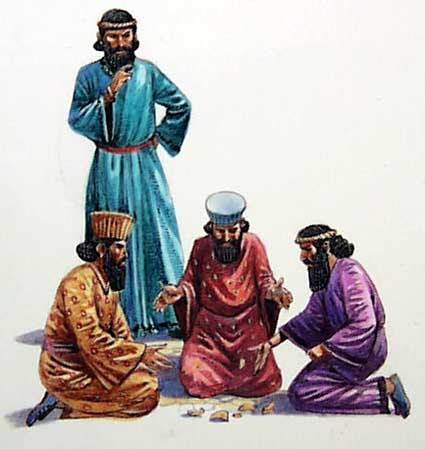 Purim borrowed from Persian paganism
Purim borrowed from Persian paganism
The Strange Origins of the Book of Esther & Purim
We now know the Book of Esther and Purim are a work of fiction created by Pharisees to bolster their political power, and what better way to have a powerful influence over people by creating a book and a festival all of your own and then using it to justify licenced violence when some group allegedly (or for real) mistreats you. There's always a snake in Eden and in the case of our modern Protestant Bibles, it's the Book of Esther. (And I know that's upsetting for many to hear because of imminently tellable stories in that book...my children when they were younger made a video play about it which is a special memory for them). Yes, the Book of Esther is a part of our history but alongside other pseudepighraphical books like the Book of Enoch, the Book of Jasher/Yashar, the Book of Jubilees, and many, many others written long after the events they claim to portray as firsthand witnesses. The festival of Hanukkah has a similar background although it is based in part on historical events that were tweeked to create a fake miracle. Both these festivals take place in the winter when Yahweh has commanded no observances in His honour. They're very popular with both Jews and most Messianics and possess a spirit quite distinct from Yahweh's true divine moedim (appointments). Gripping, ripping yarns they most certainly are but I'm afraid to say they are not historical reality, and dropping them Messianics coming to the Remnant must at some point do.
Introduction to the Epistle of Ignatius to the Philadelphians
Two weeks' ago I promised I would read you a letter written by Ignatius to the Philadelphians which is generally considered authentic - it was mentioned by the historian Eusebius in the first half of the fourth century. It is one of seven letters to six early Christian congregations (churches) and to the Bishop of Smyrna, Polycarp. Ignatius's letters are an important testimony of the development of Christian theology (since the number of extant writings from this period of Messianic history is very small), especially as it's so close to the time we're studying right now. The other six recipients of his letters were the Ephesians (whom Paul also wrote to), the Magnesians, the Trallians, the Romans (whom Paul also wrote to), the Smyrneans and to the Bishop of Smyrna himself, Polycarp. All the letters, including this one, bear signs of having being written in great haste and without a proper plan, such as run-on sentences and an unsystematic succession of thought, and they are not remotely of the same quality of the writings of the apostles themselves. Remember this is about 15-20 years after the letter sent by Yah'shua (Jesus) Himself to the Philadelphians so it gives us a unique glimpse into local developments. We could have chosen his letters to the Ephesians and Smyrneans as the themes are pretty similar but we'll take up one or both of those next week if we have time. So let's now read the Philadelphian letter.
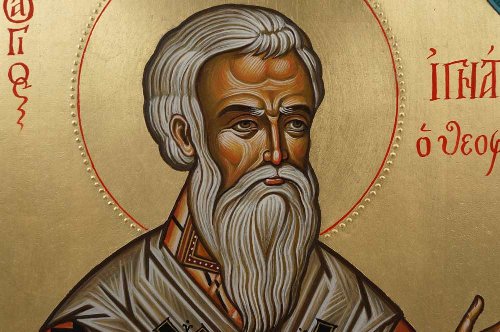 Ignatius, Bishop of Antioch, early 2nd century martyr
Ignatius, Bishop of Antioch, early 2nd century martyr
IGNATIUS TO THE PHILADELPHIANS
Chapter 1
Ignatius commends their bishop, whom they had sent to him, warns them against division and schism
1. IGNATIUS, who is also called Theophorus, to the assembly (church) of Elohim (God) the Father, and our Master Yah'shua the Messiah (Lord Jesus Christ), which is at Philadelphia in Asia; which has obtained mercy, being fixed in the concord (oneness) of Elohim (God), and rejoicing evermore in the passion of our Master (Lord), and being fulfilled in all mercy through his resurrection: Which also I salute in the blood of Yah'shua the Messiah (Jesus Christ), which is our eternal and undefiled joy; especially if they are at unity with the bishop, and presbyters (zaqqenim, elders) who are with him, and the deacons (shammashim, servants) appointed according to the mind of Yah'shua the Messiah (Jesus Christ); whom he has settled according to his own will in all firmness by his Ruach haQodesh (Holy Spirit):
2 Which bishop I know obtained that great ministry among you, not of himself, neither by men, nor out of vain glory; but by the love of Elohim (God) the Father, and our Master Yah'shua the Messiah (Lord Jesus Christ).
3 Whose moderation I admire; who by his silence is able to do more than others with all their vain talk. For he is fitted to the mitzvot (commandments), as the harp to its strings.
4 Wherefore my soul esteems his mind towards Elohim (God) most happy, knowing it to be fruitful in all virtue, and perfect; full of constancy, free from passion, and according to all the moderation of the living Elohim (God).
5 Wherefore as becomes the children both of the light and of truth; flee divisions and false doctrines; but where your shepherd is, there do ye, as sheep, follow after.
6 For there are many wolves who seem worthy of belief, that with a false pleasure lead captive those that run in the course of Elohim (God); but in the concord they shall find no place.
7 Abstain therefore from those evil herbs which Yah'shua the Messiah (Jesus Christ) does not dress: because such are not the plantation of the Father. Not that I have found any division among you (Philadelphians), but rather all manner of purity.
8 For as many as are of Elohim (God), and of Yah'shua the Messiah (Jesus Christ), are also with their bishop. And as many as shall with repentance return into the unity of the messianic community (church), even these shall also be the servants of Elohim (God), that they may live according to Yah'shua the Messiah (Jesus Christ).
9 Be not deceived brethren; if any one follows him that makes a schism in the messianic community (church), he shall not inherit the kingdom of Elohim (God). If any one walks after any other opinion, he agrees not with the passion of Christ.
10 Wherefore let it be your endeavor to partake all of the same qadosh Master's (Lord's) Supper (holy, set-apart eucharist).
11 For there is but one flesh of our Master Yah'shua the Messiah (Lord Jesus Christ); one cup in the unity of his blood; and one altar;
12 As also there is one bishop, together with his presbytery (eldership), and the deacons my fellow servants that so whatsoever ye do, ye may do it according to the will of Elohim (God).
Chapter 2
1 My brethren, the love I have towards you makes me the more large; and having a great joy in you, I endeavor to secure you against danger; or rather not I, but Yah'shua the Messiah (Jesus Christ); in whom being bound, I the more fear, as being yet only on the way to suffering.
2 But your prayer to Elohim (God) shall make me perfect, that I may attain to that portion, which by Elohim's (God's) mercy is allotted to me. Fleeing to the Gospel as to the flesh of Christ; and to the Apostles as to the presbytery (eldership) of the assembly (church).
3 Let us also love the nevi'im (prophets), forasmuch as they have led us to the Besorah (Gospel, Good News), and to hope in Messiah, and to expect Him.
4 In whom also believing they were saved in the unity of Yah'shua the Messiah (Jesus Christ); being qadosh (holy, set-apart) men, worthy to be loved, and had in wonder;
5 Who have received testimony from Yah'shua the Messiah (Jesus Christ), and are numbered in the Gospel of our common hope.
6 But if any one shall preach the Jewish law unto you, hearken not unto him; for it is better to receive the doctrine of Messiah from one that has been circumcised, than Judaism from one that has not.
7 But if either the one, or other, do not speak concerning Messiah Yah'shua (Christ Jesus); they seem to me to be but as monuments and sepulchres of the dead, upon which are written only the names of men.
8 Flee therefore the wicked arts and snares of the prince of this world; lest at any time being oppressed by his cunning, ye grow cold in your charity. But come altogether into the same place, with an undivided heart.
9 And I bless my Elohim (God) that I have a good conscience towards you, and that no one among you has whereof to boast either openly or privately, that I have been burthensome to him in much or little.
10 And I wish to all, among whom I have conversed, that may not turn to a witness again them.
11 For although some would have deceived me according to the flesh, yet the Ruach (Spirit), being from Elohim (God), is not deceived: for it knows, both whence it comes and whither it goes, and reproves the secrets of the heart.
12 I cried whilst I was among you; I spake with a loud voice: attend to the bishop, and to the presbytery, and to the deacons.
13 Now some supposed that I spake this as foreseeing the division that should come among you.
14 But he is my witness for whose sake I am in bonds that I know nothing from any man. But the Ruach (Spirit) spake, saying on this wise: Do nothing without the bishop:
15 Keep your bodies as the temples of Elohim (God): Love unity; Flee divisions; Be the followers of Messiah, as He was of His Father.
16 I therefore did as became me, as a man composed to unity for where there is division, and wrath, Elohim (God) dwelleth not.
17 But the Master (Lord) forgives all that repent, if they return to the unity of Elohim (God), and to the council of the bishop.
18 For I trust in the grace Yah'shua the Messiah (Jesus Christ) that he will free you from every bond.
19 Nevertheless I exhort you that you do nothing out of strife but according to the instruction of Messiah.
20 Because I have heard some who say; unless I find written in the originals, I will not believe it to be written in the Gospel. And when I said, It is written; they answered from what lay before them in the corrupted copies.
21 But to me Yah'shua the Messiah (Jesus Christ) instead of all the uncorrupted monuments in the world; together with those undefiled monuments, His cross, and death, and resurrection, and the faith which is by Him; by which I desire, through your prayers, to be justified.
22 The cohenim (priests) indeed are good; but much better is the Cohen Gadol (High Priest) to whom the Holy of Holies has been committed; and who alone has been entrusted with the secrets of Elohim (God).
23 He is the door of the Father; by which Abraham, and Isaac, and Jacob, and all the nevi'im (prophets), enter in; as well as the Apostles, and the messianic community (church).
24 And all these things tend to the unity which is of Elohim (God). Howbeit the Besorah (Gospel, Good News) has somewhat in it far above all other dispensations; namely, the appearance of our Saviour, the Master Yah'shua the Messiah (Jesus Christ), His passion and resurrection.
25 For the beloved nevi'im (prophets) referred to Him; but the Besorah (Gospel, Good News) is the perfection of incorruption. All therefore together are good, if ye believe with charity (love).
Chapter 3
Informs them he had heard that the persecution was stopped at Antioch: and directs them to send a messenger thither to congratulate with the congregation (church)
1. Now as concerning the assembly (church) at Antioch which is in Syria, seeing I am told that through your prayers and the bowels (compassion) which ye have towards it in Yah'shua the Messiah (Jesus Christ), it is in peace; it will become you, as the Assembly of Elohim (Church of God), to ordain some a deacon to go to them thither as the ambassador of Elohim (God); that he may rejoice with them when they meet together, and glorify Elohim's (God's) name.
2 Blessed be that man in Yah'shua the Messiah (Jesus Christ), who shall be found worthy of such a ministry; and ye yourselves also shall be glorified.
3 Now if you be willing, it is not impossible for you to do this for the grace of Elohim (God); as also the other neighbouring assermblies (churches) have sent them some bishops, some cohenim (priests) and some shammashim (deacons).
4 As concerning Philo the deacon of Cilicia, a most worthy man, he still ministers unto me in the davar Elohim (Word of God): together with Rheus of Agathopolis a singular good person, who has followed me even from Syria, not regarding his life: These also bear witness unto you.
5 And I myself give thanks to Elohim (God) for you, that you receive them as the Master (Lord) shall receive you. But for those that dishonoured them, may they be forgiven through the grace of Yah'shua the Messiah (Jesus Christ).
6 The charity (love) of the brethren that are at Troas (Troy) salutes you: from whence also I now write by Burrhurs, who was sent together with me by those of Ephesus and Smyrna, for respect sake.
7 May our Master Yah'shua the Messiah (Jesus Christ) honour them; in whom they hope, both in flesh, and soul, and spirit; in faith, in love, in unity. Fare-well in Messiah Ysah'shua (Christ Jesus) our common hope.
The End of a Whole Era and the Beginning of a New
It's different to Paul and John, isn't it? And yet there are obviously recognisable Pauline and Johannine theological concepts. The basics of the Besorah (Gospel, Good News) are all there and familiar to true believers but there are one or two new issues being addressed, if not for the first time, then certainly more urgently and with some different solutions. The death of John must have been a huge blow to the Anatolian qodeshim (saints, set-apart ones) amongst whom he had made his home for so long. Losing him must have been a bit like losing your last parent. They say that when your parents die, your past dies too. So John's death was their last apostolic link to Yah'shua (Jesus) Himself. As John was almost certainly a teenager when Yah'shua (Jesus) was alive, it means there can't have been many survivors left, if any, from that time. The first generation was well and truly gone just as mine one day will be. It marked the end of an era - the Apostolic era, and now we're in the Sub-Apostolic or Post-Apostolic time. When parents die, things change, and we can see some of those changes a decade-and-a-half to two decades later here...I expect you were surprised by at least one statement in that letter, Ignatius' apparently negative reference to the Torah (Law), which we'll discuss fully next week as I know a number of people may be panicking. So, yes, it's amazing how much can happen in the short space of 15-20 years which is the time between the letters found in the Book of Revelation given by Yah'shua (Jesus) and the post-apostolic leadership of Ignatius, Polycarp and other pupils of the late apostle John.
 John's death marked a big change for the messianic community
John's death marked a big change for the messianic community
Disunity and Schism Threatened the Whole Messianic Community
To get a feel of this change you need to read all of Ignatius' seven epistles as well as the epistles of his contemporary, Polycarp, who outlived him even though he too was eventually martyred. For as soon as John, the last apostle died, it seems Satan made a full frontal attack by actively spewing one heresy or false doctrine after another. While John was alive, there was an authoritative voice as one who personally knew the Master, but once he was gone, the testimony of the leaders was second-hand and therefore inevitably inferior. What is clear from all these sub-apostolic letters, is that doctrinal disunity and schism became the main problem, and even though the beginnings of this were evident in Book of Revelation times, they are now fully-blown and threatening the very survival of the Messianic Community (Church). Whereas the apostle John was able to contain the heresies by his mere presence as 'the beloved disciple', the one "whom Yah'shua (Jesus) loved" (Jn.13:23; 21:20, NKJV), dealing swiftly with an early form of Gnosticism called Doceticism (which I have already mentioned once to you in this series). But now it has come to town with reinforcements, as it were, making its appeal to the carnal man all over again.
The Emergence of a New Kind of Authority Structure
In order to cope with this serious problem undermining the original "emunah (faith) which was once for all delivered to the qodeshim (saints, set-apart ones)" (Jude 3, NKJV), the second generation of leadership is resorting to a kind of legalistic, ecclesiastical (church) authoritarianism in order to maintain doctrinal cohesion and order. They claim they possess this authority that has been vested in themselves as the successors to the apostles as their personal disciples. This is not a full-blown Catholic ecclesiastical claim because we are still some time away from popes and cardinals and all these pompous offices but we are definitely heading in that direction, albeit it in the early days in very small increments. The Messianic Community (Church), in order to survive, finds itself on a trajectory that becomes harder and harder to regulate and control by purely spiritual means. And as each new generation of leaders arises, so we find the importance of ecclesiastical (church) authority both growing and the importance of which being constantly stressed and inserted into creeds to ensure their continuance. By the beginning of the second century this authority already centres squarely in independent bishops. Though authoritarian, it is still benevolent, necessary and helpful, but for how long can this last before it becomes corrupted?
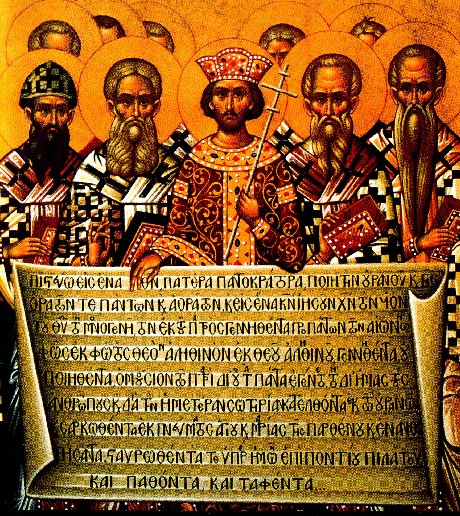 The post-apostolic age of the first Christian bishops
The post-apostolic age of the first Christian bishops
The Complex Evolution of Authority Structures
It's important we catch this early development and put it squarely under the historical microscope because we are entitled to ask a number of important questions concerning it. Because once this particular train is set in motion, it becomes harder and harder to stop as a number of assumptions started being added about the way the Messianic Community (Church) ought to be run in the future. This is by no means a simple matter because so many different forces are in play, not least from the secular pagan authorities who wish to have their own way in all matters. In the first century the Messianic Community (Church) is unquestionably apostolic (led by apostles) and presbyterian (led by presbyters, elders or zaqqenim locally) whose authority to organise and lead congregations comes directly from the living apostles. Once the apostles have died off, all that is left to lead are the elders (Gk. presbyteros), one of whom is the spiritual father, shepherd (Gk. poimen, e.g. Eph.4:11), overseer or head, being called in the Messianic Scriptures (New Testament) both presbyteros and episkopos (from which we get the English word viâ Latin, episcopalian, meaning 'ruled by bishops').
Leadership Rôles Changing
In the first century no clear distinction was made between presbyteros and episkopos. A presbyteros was an 'elder' or 'senior' member of the congregation, and the word is also the source of our English word 'priest' but by the time we come to Ignatius and Polycarp in the early second century a clear distinction is evident between the presbytery (elders) and bishoptic (bishops), there being no equivalent division in the Hebrew equivalent of zaqqen since all of this took place in the Greek-speaking provinces of the Roman Empire. How has this come to be?
The Move From East to West
Well, in order to properly understand how all of this happened you need to understand that the heartland of the Besorah (Gospel) was gradually shifting westwards, beginning in Jerusalem and Palestine and then moving to a new centre in Ephesus, the capital of the Greek-speaking Roman Province of Asia or Western Anatolia. So I want you to picture in your mind's eye the western part of modern-day Turkey, the left-hand third of a rectangle laying on its side. This is where John's Circuit, centred in Ephesus on the coast was located (the first of the 7 Asian congregations we studied) and where the new Bishoprics were centred at the beginning of the second century which is what we're looking at now. To the south-east lies Aramaic-speaking Jerusalem but it's importance has already begun to diminish after AD 70 when the temple was burned down by the Romans. To the north-west lies Latin-speaking Rome which has yet to rise in prominence. Between AD 30, when Yah'shua's (Jesus) ministry approximately began and AD 70, with Paul's ministry starting in the 50's, there's a marked shift, and there the heartland remains for a good century or more with the Roman Assembly gradually rising in prominence in the mid to late third century. And inevitably the language and culture of these regions impacts the developping theology, for good and bad. The Greeks, renowned for their philosophers, brings a strong intellectual element into the Besorah (Gospel, Good News) and the Latins, famous as organisers, gradually turn the Gospel into an institution which it remains for over one-and-a-half thousand years until it reaches the shores of America whence it becomes commercialised in the 20th century.
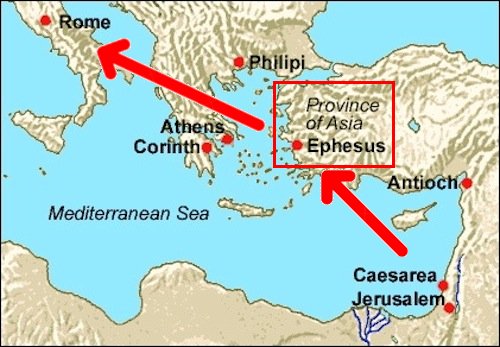 The westward move of Kingdom authority to the Province of Asia
The westward move of Kingdom authority to the Province of Asia
Jerusalem, the First 'Bishopric'
The earliest organisation of the Messianic Community (Church) is to be found in Jerusalem where we find a council or college of ordained presbyters (elders) chaired by James the Just, half-brother of Yah'shua (Jesus), who became the first episkopos or 'bishop' of the city (Ac.11:30; 15:22). In Acts 14:23, Paul ordains presbyters or elders in the various congregations of Anatolia. By the time we come to Acts 20:17, Titus 1:5-7 and 1 Peter 5:1, some of these presbyters are overseers (like the modern 'Pastor', which means 'Shepherd') so that by the time we come to Ignatius, Polycarp, other early 'church fathers' (as they have come to be known), the Didache (AD 150, Syria) and the First Epistle of Clement (AD 96, first Bishop of Rome), there are two sets of local congregational officers: presbyters (overseers, elders, shepherds, zaqqenim) and deacons (shammashim, servants). We are told that Paul left Timothy in Ephesus and Titus in Crete to oversee the local assemblies there and to ordain presbyters or bishops (remember the terms are one and the same at this time) as pastoral leaders and to exercise general oversight. So the 'Pastor' and 'Bishop' were at first a single local office. When Ignatius, Polycarp and others from the time refer to 'bishops' they are essentially speaking of what we would now call 'pastors'.
The Rise of the Bishops
As the Messianic Community (Church) grew, so bishops no longer served individual congregations (as Bishop Polycarp did at Smyrna and Bishop Ignatius did at Antioch), and instead the Bishop in a large city like Rome or Ephesus appointed priests (presbyteros) to minister multiple congregations in the same city. These Metropolitan Bishops came to be called Metropoles. Each of these priests, presbyters or pastors acted as the Bishop's delegate. So the episkopos and the presbyteros, originally one and the same, separated as a practical measure as the congregations multiplied. And, unfortunately, denominations have separated over what these words mean, some (like the Presbyterians) claiming that the local Presbyter is the highest official in the Messianic Community (Church) hearkening to an earlier time, and others (like the Episcopalians and Anglicans) claiming the Bishop is the highest authority, though even those acknowledge a 'Chief Bishop' or 'Archbishop' of Canterbury and another in York (in the case of the Anglicans). Even bigger organisations like the Roman Catholic Church have a 'Super Arch-Bishop, as it were, whom they call the Pope. The Eastern Orthodox are similar, though they have no equivalent of a 'Pope', and their highest authories are the 'Patriarchs' which would be equivalent of Arch-Bishops. (There are lots of other offices I have not mentioned in the Catholic hierarchy, incidentally).
Different Denominational Types of Bishop
I realise all this denominational terminology may at first seem confusing but it is important we understand why various church structures evolved in the way they have. But do not assume that Catholic, Orthodox, Lutheran, Anglican and Episcopalian 'Bishops' are the same as Methodist 'Bishops', Pentecostal 'Bishops' or Mormon 'Bishops' [1]. We as Messianic Evangelicals theoretically have Bishops and indeed have had two Bishops in our history, one over India and another over East Africa. For us they are essentially Senior Pastors over a larger area comprising several congregations who are in some way related to one another, often (though not always necessarily) by planting, and certainly by language and culture. Thus the Pastor of a congregation that establishes and mentors the leadership of a daughter congregation not uncommonly becomes its Bishop as determined by the Apostolate. In NCAY, the Bishops are subject to the Apostles, thus combining the 1st and early 2nd century models [2].
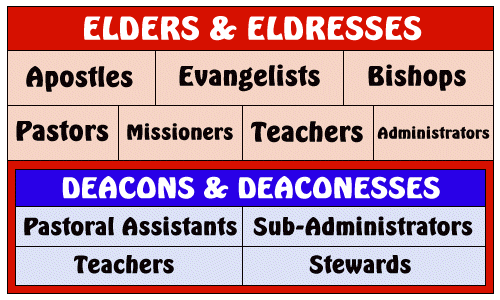 The NCAY messianic evangelical organisational model
The NCAY messianic evangelical organisational model
From Individual Assemblies to Conventions and Synods
Now I doubt we will have Bishops again (but who knows) on account of the way the world is going because our mission in the end-times is a little different [3], but I could be wrong. Churches who call themselves 'primitive Christians' who want to get back to the simplicity and intimacy of the New Testament fellowships and who refuse to ordain officers higher than that of the Pastor (or equivalent) as they grow bigger in size are, in my opinion, naïve. Take the Baptists, for example, who for wont of a better word we might call 'Primitive Christians' or 'congregationalists' as the congregation is the highest unit of administration and so is effectively independent of all other congregations. As they have got bigger they have understood the need for a higher organisational structure to maintain their denominational and doctrinal integrity, and so they have organised into Conventions, each with a President. You have all heard of the largest one I'm sure, the Southern Baptist Convention, with about 1,160 local associations, 47,530 churches and 14½ million members, of whom Albert Mohler was president for many years (I mention him simply because I have read many of his books). In America alone there are about 25 different Baptist denominations with their conventions and elected heads. The same is true of the Lutheran Church which is organised into Synods such as the 'Missouri Synod' in the USA. Then there are all the 'Independent' churches each of which is effectively a denomination in its own right. We won't even go into all the different messianic denominations and groups.
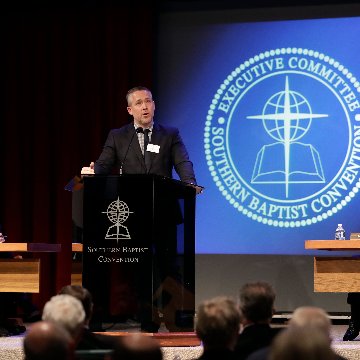 The Southern Baptist Convention
The Southern Baptist Convention
The Bane of Fossilised Institutions
Why am I mentioning all of this? Firstly, because we need to be informed (and I have but scraped a little part of the surface here today). Secondly, because we need to understand what happened at the beginning of the second century and why, because very clearly there was no way the New Testament Messianic Community could survive as a 'primitive church' without it being utterly overwhelmed by a very determined Adversary bent in eradicating it even before the last apostle, John, had gone home to be with his Master. The state of the Anatolian or Asian Community (Church) is clearly precarious even in Book of Revelation times and by the time Ignatius and others have assumed the apostolic mantle as bishops its clear that the main message he and other leaders bring is the importance of preserving unity, and that that such unity can only be preserved by having a proper authority structure in place to replace the apostles. And that brings with it a number of risks about which modern Christian and Messianic 'primitivists' are rightfully concerned. The great big institutions, largely spiritually dead and riddled with false teachings, are what has resulted, and large institutions change very slowly. More often than not they fossilise and dig their heels in because what keeps it together is power and the dead weight of man-made tradition rather than the Ruach (Spirit) and the Emet (Truth). That was the state of Judaism too when Yah'shua (Jesus) was born, held captive by the Pharisee and Sadducee power-base.
The Various Early Heresies and Problems
Every age has its heresies and the two big ones, continuing on from John's time, were an early form of Gnosticism called Doceticism and - and I'm sorry if this upsets and bursts the bubbles of uninformed messianics - the Judaising Heresy. Of course this and other early second century letters are concerned about more than these two particular issues and cover a wide body of material. In fact, these second century believers are not only under doctrinal assault but they are being persecuted to the death by the Imperial Roman cult of mandatory Emperor-worship, a different kind of power struggle and one which has continued uninterrupted even to this day. There were those who denied the resurrection, the judgment, many of the Torah commandments, the incarnation, the Master's Supper, and so on.
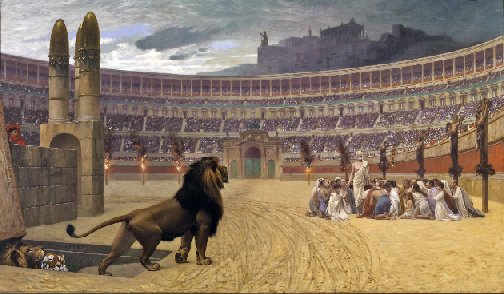 The Imperial death cult - early martyrs in the Colloseum
The Imperial death cult - early martyrs in the Colloseum
Messianic Evangelical Etymologists
Ignatius speaks for the first time of the 'catholic church' in his letters by which he does not mean the Roman Catholic Church but the Universal Messianic Community or Body of Christ, unsplit by denominational strife caused by heresy taking root. Part of the legacy of the denominationalism that we have inherited is the confusion in Gospel terminology, the Bishop/Pastor/Elder being an example. Defining what we mean and what the early believers meant is therefore critically important, a reason I spend so much time on these things which I know some do not find particularly interesting or useful until it comes to your having to explain your beliefs to those from differently evolved traditions, and when voices from without our own ranks start asking questions and pushing once again for the old fallen ways. So someone has to address these issues and it falls upon me to make sure they are straightened out in advance of the second generation taking command. Structure does matter as anyone with a family knows all too well because these things don't just automatically sort themselves out. So biblical etymology, the meaning of words, ranks rather high in our teaching efforts because if you can't communicate precisely, chaos is the inevitable result. Sadly, we use the same vocabulary but the words mean different things to those in different denominations
The Episkopé - A Bishop or Overseer?
Now if you'll turn with me to 1 Timothy 3:1-2 (and its parallel in Titus 1:7) which is a list of instructions to an episkopé, you will find this word translated into English in at least fifteen different ways. The vast majority translate it in one of two ways which I am going to represent by the New King James Version (NKJV) and the New American Standard Bible (NASB), respectively:
"This is a faithful saying: If a man desires the position of a bishop, he desires a good work. A bishop then must be blameless..." (1 Tim.3:1-2, NKJV; cp. 1599 Geneva, KJV, ASV, RSV, NRSV, AmpV, Douay, JBP, Jubilee Bible, RNAB, NCB, WEB, Wycliffe, KNT)
"It is a trustworthy statement: if any man aspires to the office of overseer, it is a fine work he desires to do. 2 An overseer, then, must be above reproach..." (1 Tim.3:1-2, NASB; cp. NASU, NIV, Holman, ESV, Darby, AmpV, WEB, NLT, ISRV).
So the majority translate it either "bishop" (most Catholic and Protestant scholars' and older conservative denominations' Bibles from the 1599 Geneva and King James to the NRSV) or "overseer" (NIV, ESV, ISRV, etc.).
Other Definitions
However there are many more translations that render episkopé as "Pastor" (LB), "eldership" (AENT), "elder" (Magiera Peshitta), "presiding elder" (JB e1, LB) "Congregation Leader" (CJB), "leadership" (NEB), "leader and guardian of a community" (Barclay), "superintendant" (AmpV, WEB), "supervisor" (CLNT), "church official" (CEV), "church leader" (GNB, LB), "Mashgiach Ruchani/Spiritual Overseer" (OJB), "Elder" (HRV, NLT), "teaching-overseer, or shamesh" (RSTNE 2e).
Ironies
And yet, ironically, though only one version that I know of - the paraphrase Living Bible - uses the word "pastor", millions and millions of Protestant Christians are led by 'pastors' when their English Bibles mostly read either 'bishop' or 'overseer'. Most ironic of all are the King James Version-only folks whose King James Version uses "bishop". Why? Because most of them are Baptists and they have always been led by 'pastors'.
Bishops, Ancient and Modern
Now personally I don't care if congregations are led by 'overseers' (as the Jehovah's Witnesses are) or 'pastors'. We have elected to use the latter and use that title even if we may use other words when discussing the matter academically. Where we can and do have issues is with this word 'bishop' because people can get the wrong idea that these key passages that talk about congregational leadership only apply to bishops over a large group of congregations. With standards as slack as they are in the 21st century, the last thing we want is a loophole for commandment-breaking church leaders. And therefore we need to be aware that what today are called 'bishops' in a wide variety of churches nowhere existed in the New Testament. They are a later development created to meet a legitimate need. I suppose the nearest equivalent to a modern day 'bishop' in biblical families anciently would have been a plural family where, for instance, Jacob was a 'pastor' to each of his wives and a 'bishop' to all of them collectively. So there is a precendent, I believe.
The Importance of a Unified Practice and Set of Doctrines
Do I believe we need, and will arrive at, a universally agreed set of doctrines and terms? Abolutely. The Remnant must be equipped with both and return to the original phronema or spirit of the New Testament fellowship if it is to enjoy unity or it will be doomed to early failure, as are many groups now claiming to be the 'Remnant' today will be. Restoration is often a slow, gradual process, that requires a lot of preparatory footwork.
Conclusion
Next week we will continue looking at today's theme of unity and authority by looking at some other matters raised by Ignatius and other sub-aspostolic fathers so we can understand how the Messianic Community has evolved, both in the short period between John in his latter years and Ignatius right before his martyrdom, and today. In the meantime as we rapidly head for the New Year, may Yahweh bless you and lead you to a full repentance and sanctification in Yah'shua (Jesus) our Messiah. Amen.
Continued in Part 16
Endnotes
[1] Mormon (LDS) congregations or 'wards' are led by 'Bishops' and junior 'Branches' by 'Branch Presidents' (similar in some respects to the 2nd century situation) whereas a liberal Mormon denomination (the Reorganized LDS Church, now renamed 'Community of Christ') has 'Branches' led by 'Pastors'. Since the Mormons believe themselves to be the restoration of the first century church, which had no bishops, they disqualify themselves on this (and numerous other) organisational grounds.
[2] See Organisation of the New Covenant Assemblies of Yahweh
[3] For the underground NCAY house fellowship structure, see Fellowship and Membership in NCAY
Acknowledgements
[1] N.T.Wright & Michael F.Bird, The New Testament in Its World: An Introduction to the History, Literature, and Theology of the First Christians (Zondervan Academic, Grand Rapids, Michigan: 2019)
[2] Eerdmans, ed. David Noel Freedman, Dictionary of the Bible (Eerdmans, Grand Rapids, Michigan: 2000)
[3] Tom Wright, Revelation for Everyone, Book of Revelation (SPCK, London: 2011)
[4] David Pawson, Unlocking the Bible: A Unique Overview of the Whole Bible (Collins, London: 2007)
Further Reading
[1] The Deconstruction and Reconstruction of Biblical Authority
[2] The Pastoral Office: A Guide to Pastoral Leadership
 Click the image for the whole Series
Click the image for the whole Series

 V331
V331
|


